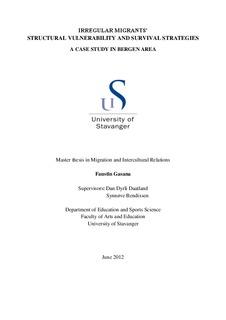| dc.description.abstract | This study is about irregular migrants’ experiences and how they deal with exclusionary practices they face as they attempt to access the Norwegian health care system as well as the labor and housing markets. The thesis is based on a qualitative study among irregular migrants in Bergen area.
Drawing on the concept of structural vulnerability, the thesis investigates the underlying factors and structures that create unequal power relations and dependency. To this end, the study has investigated how migration management regimes of control and enforcement are practiced and how they shape individual irregular migrants’ experiences in diverse ways.
The research findings point to and confirm enormous challenges and obstacles that irregular migrants are faced with and strategies they deploy to overcome them. This study has further found that the three areas of healthcare, employment and housing were intertwined and mutually reinforcing hence generating a cumulative disadvantage.
Irregular migrants endeavor to deal with their access difficulties by resorting to short-term strategies such as self-medication when they are sick, working in the black labor market to earn a living or moving house frequently to avoid being a burden to a host friend.
Moreover, this research has foregrounded the crucial role of migrant networks in the irregular migrants’ everyday lives. Irregular migrants actively use their networks as a resource that supports them in their everyday struggles to earn a living, to secure medical help and to find a place to stay.
Furthermore, the study has also shown that irregular migrants’ experiences and survival strategies are mediated by their situation of entrapment between ‘here and there.’ Respondents have expressed feelings of disillusionment, disempowerment, disenfranchisement and lack of control.
The utilization of the concept of structural vulnerability has enabled to explain and understand irregular migrants’ experiences by looking into the factors and structures underpinning their difficulties to access basic necessities such as healthcare, work and shelter. Structural vulnerability has also permitted to unveil the role of the state policies, legislations and practices in creating irregular migrants’ subordination and dependency. | no_NO |
